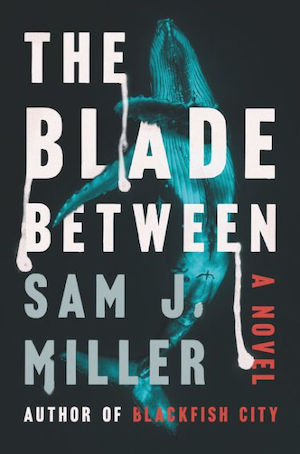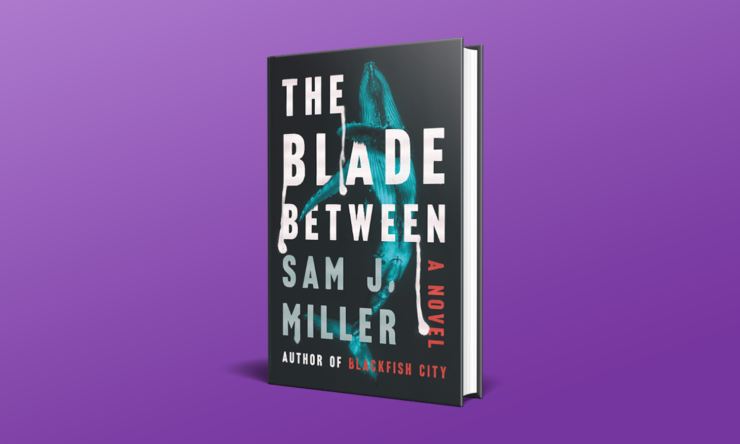We’re excited to share an excerpt from Sam J. Miller’s The Blade Between, a ghost story about a rapidly changing city in upstate New York and the mysterious forces that threaten it—available now from Ecco.
Ronan Szepessy promised himself he’d never return to Hudson. The sleepy upstate town was no place for a restless gay photographer. But his father is ill and New York City’s distractions have become too much for him. He hopes that a quick visit will help him recharge.
Ronan reconnects with two friends from high school: Dom, his first love, and Dom’s wife, Attalah. The three former misfits mourn what their town has become—overrun by gentrifiers and corporate interests. With friends and neighbors getting evicted en masse and a mayoral election coming up, Ronan and Attalah craft a plan to rattle the newcomers and expose their true motives. But in doing so, they unleash something far more mysterious and uncontainable.
Hudson has a rich, proud history and, it turns out, the real-state developers aren’t the only forces threatening its well-being: the spirits undergirding this once-thriving industrial town are enraged. Ronan’s hijinks have overlapped with a bubbling up of hate and violence among friends and neighbors, and everything is spiraling out of control. Ronan must summon the very best of himself to shed his own demons and save the city he once loathed.
Chapter One
Welcome to Hudson: a whale of a town.
Bright raw wintertime, and Warren Street is a swathe of white and red. Blood-soaked men drag strips of whale flesh through the snow. Black smoke billows from man-size iron try-pots. Bones reach for the sky like irrational red fences; rib cages recently flensed. Hooks and knives and blades as long as swords slice and hack the air, a whole weird lexicon of specialized instruments: mincing spade; monkey-belt; fire-pike; throat-chain; fin toggle. The strips are sliced down into blocks; the blocks are fed to the bubbling pots. The whole city smells like blood and wood smoke and the thick meaty mammalian stink of melting blubber—marine and vaguely reminiscent of alcohol.
Blubber and skin and spermaceti are the engine of industry, the bloody gold that has powered Hudson’s rise to power, boiled down and barreled and shipped off to light lanterns as far away as London—the baleen will become women’s corsets, and the bones will be returned to the river—and the teeth will be scrimshawed and sent home to sweethearts, sold to collectors—but what will be done with the rest of these magnificent monsters, the livers as big as cows, the eyes the size of a human head? Intestines so long they could be stretched off to mark the extent of any one of Hudson’s uphill streets. Brains bigger than any human’s, and wiser too, with the things they’ve seen, at depths that would crush a man like a baby chick in a fist. Sunken empires, sea monsters believed to be mere myth. The skeletons of a million drowned men and women.
What will happen to the rest of the whale?
Buy the Book


The Blade Between
Some will be fed to dogs and pigs. Some will be cooked and eaten by humans.
Most will be buried. Long trenches along the waterfront at first, then creeping up the streets as space runs out.
The hearts and brains of whales will feed Hudson’s soil. Their blood ascends to the sky in oak tree branches, feeds its people in apples and corn. Seeps into the stone and cement of the foundations of its homes.
The sky darkens. The day’s work is done. Men drink cheap cider. Tomorrow, maybe, more whale carcasses will come. The harbor stretches around into North Bay. You can count a couple dozen tall ship masts.
In twenty years the railroad will arrive, heading north from New York City, bound for Albany, for Canada, its path perfectly plotted to cut off Hudson’s North Bay. Cripple the city’s shipping trade. Start its slow decline into irrelevance.
Forty years after that, Hudson will have become the East Coast’s largest center for prostitution, the Diamond Street whorehouses so notorious that they’ll have to change the name of the street to Columbia after the governor personally sends a swarm of state troopers to bust up the brothels that local authorities have coddled—and patronized, and exploited for information—for decades.
Bootleggers will base their operations out of Hudson. So will crystal meth manufacturers, many years later. Movies will shoot here, ones that want somewhere that still looks like the Great Depression. Ones where Jack Nicholson is an alcoholic or Harry Belafonte is a broken-down gambler.
Hudson has been many cities, but it has always been this one. The one with soil steeped in blood; with a harbor full of bones.
Chapter Two
Easy, sailor—no need to take the stairs two at a time—she’s not gonna get any less dead, no matter how much you hurry.
Dom slows down. Takes a deep breath.
These things happen. Town like Hudson, they happen all the time.
Her neighbor found her. Came by to borrow a cup of sugar, allegedly—more likely dropped by to buy weed—used the key Ossie was entirely too free with giving away copies of—saw her lying on her bed—checked for a pulse—found none—called the police.
Or, more accurately, called Dom.
Nothing unusual about that. Small town; she’d gone to school with Dom, same as Ossie, same as everybody. The fact that she and Dom and Ossie had smoked up together in this very same apartment two nights before—the fact that she knew that Ossie and Dom were sleeping together—none of that needed to go in a report. Dom instructed her to call the actual police, who of course sent him. Anything that happened downstreet, they sent him. The lone Black cop on the force.
And now, here he is. In the sad sooty stairwell of Ossie’s building. Smelling cigarettes and spilled milk and cheap carpet cleaner—but underneath it all, faint random atoms of the scent of some delicious meat dish, something the nice Jewish lady on the second floor cooked every Friday for so many decades that you could still smell it six years after her death. Dom can’t recall her name. Mrs. Kubiak? The ghost of the smell would never leave that building, not entirely.
That’s all any of us leaves behind, sailor. If we’re lucky. A smell in the air; a bunch of people who can’t quite remember our name.
Dom stands up straight. Gets himself together. Goes back into the apartment.
“Pills, probably,” Louise says, looking at her with what seems to be anger but could be anything. “I won’t tell anybody about you two.”
“It’ll be fine,” Dom says. He takes the statement, lets Louise go, and goes in to sit with Ossie while they wait for the coroner.
She’s on her back, arms crossed across her chest. He doesn’t think he’s ever seen her be still. Ossie was a live wire, a constant frenzy. It’s what he’d always loved about her. As far back as middle school, she’d made bad decisions look magnificent. Even getting high couldn’t make her chill—just unleashed a different kind of crazy: kinetic, compelling thoughts from her head, a new set of rambling theories and opinions.
And of course he’d never spent the night, so he’d never seen her sleep. When their time together was up, Dom went home. Ossie stayed here alone.
She looks alone, now. Dressed for bed, in a long T-shirt where a white and a black sperm whale made a yin-yang symbol. On top of the cluttered dresser, two empty pill bottles and a very minimalist suicide note. cremation, no ceremony. And below that, standing in for a signature, a drawing of a cartoon whale. The one thing Ossie knew how to draw.
He didn’t love her. They’d been friends. They were good together, in bed.
He doesn’t feel guilty, either. This hurt is purer, harsher. She is gone. There will be no more late-night theories about Richard Linklater movies, no more of the cookies she was forever baking but never mastering.
Dom sits down on the bed beside her. He feels so heavy.
“Ossie,” he says, as close to a good-bye as he can come, and leans over so he can close her eyes. The pressure on the mattress causes her head to turn toward him slightly. Water dribbles out of the side of her mouth. Not spit: water. There is no glass by the bed, nothing nearby that she could have taken a sip from. Unless she swallowed the pills and then took a drink in the bathroom and then got into bed and somehow didn’t swallow it or spit it up in the convulsions that almost certainly would have ensued? But even if that was possible—and it probably wasn’t—why would she go to all that trouble?
He leans over. Sniffs her mouth. It smells like her—like cinnamon, chocolate—but like something else, too. The sea at night, Dom thinks, and whisks the thought away, and kisses her. The water is salty. Not like table salt. Dom recoils, stands up, suddenly eerily convinced that if he’d looked at her a second longer he’d have seen a hermit crab scuttle up out of her throat.
Someone downstairs is screaming. Someone always is, on State Street. Even though it’s only a couple of blocks from Warren Street, where skyrocketing property values have replaced every poor family with a wealthy New York City transplant, State Street has stubbornly refused to be transformed. He knows exactly who is screaming, too. Because of course he does. He knows exactly who everyone is on State Street.
He hadn’t closed Ossie’s eyes, and now he can’t.
Excerpted from The Blade Between, copyright © 2020 by Sam J. Miller.










